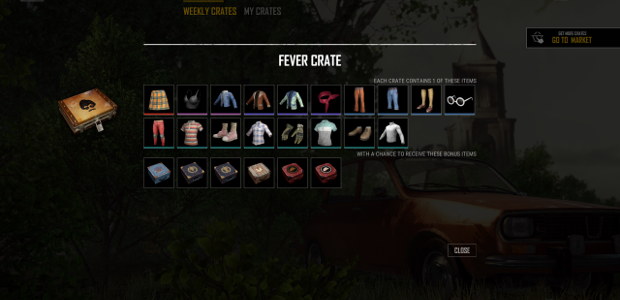ESRB introducing 'In-Game Purchases' label for ratings
Not a drastic step
The Entertainment Software Rating Board (ESRB), the North American industry body which assigns games age ratings, will expand its labelling on physical boxed games to include warnings of "In-Game Purchases". This will cover everything that can be bought digitally for real money, from season passes and skins to microtransaction currencies and random loot boxes. They're only a decade late to noticing all this, then.
Some industry commentators are disappointed that the ESRB don't take a tougher stance against loot boxes, specifically pointing them out, but it's no surprise. The ESRB exist to protect big publishers, and recently responded to a US senator's concerns about loot boxes by calling them "a fun way to acquire virtual items."
The ESRB's new "In-Game Purchases" label will appear on the boxes of games in North American stores, as well as on the downloadable versions of those games. It'll be similar to how ESRB ratings bits on boxes already list content descriptors that affect the rating--sex, drugs, rock 'n' roll and all that--as well as aspects like if users interact with each other, if it provides unrestricted Internet access, and such. This new label is a broad one, as the ESRB explained in the announcement:
"The new In-Game Purchases label will be applied to games with in-game offers to purchase digital goods or premiums with real world currency, including but not limited to bonus levels, skins, surprise items (such as item packs, loot boxes, mystery awards), music, virtual coins and other forms of in-game currency, subscriptions, season passes and upgrades (e.g., to disable ads)."
I don't doubt that this change is in response to growing complaints about loot boxes in games which let players optionally skip unlock grinding by paying money. Some consider this actual gambling, which I'm not entirely onboard with because it is basically just Kinder Eggs for gun skins and unlocks, though I would certainly agree that microtransaction-pushing loot boxes are designed to exploit people, they can prey on the vulnerable, as a progression system they make games worse, and they're scummy - especially in something for kiddywinkles, like Star Wars.
The question of gambling hit the mainstream following Star Wars Battlefront 2's guffy loot boxes, and has drawn attention from a number of governments. Questions were raised (and dismissed) with the UK government, and the Belgian Gaming Commission condemned loot boxes without taking action. Within the ESRB's own purview, North America, actions against loot boxes have included law proposals from the Hawaiian state government and probing questions from senators.
On February 14th, Margaret Wood Hassan, the senator for New Hampshire, sent the ESRB a letter asking them to review their policy on loot boxes. She asked the ESRB to consider specifically labelling games which use them, to examine how ethical loot boxes are, to research how widespread and lucrative they are, and to "develop best practices for developers, such as ethical design, tools for parents to disable these mechanisms, or making them less essential to core gameplay." It doesn't matter, she said, whether loot boxes are gambling or not.
"The prevalence of in-game micro-transactions, often referred to as 'loot boxes', raises several concerns surrounding the use of psychological principles and enticing mechanisms that closely mirror those often found in casinos and games of chance. The potential for harm is real. Recently the World Health Organization classified 'gaming disorder' as a unique condition in its recent draft revision of the 11th International Classification of Diseases. While there is robust debate over whether loot boxes should be considered gambling, the fact that they are both expensive habits and use similar psychological principles suggest loot boxes should be treated with extra scrutiny. At minimum, the rating system should denote when loot boxes are utilized in physical copies of electronic games."
The ESRB responded to Hassan's letter yesterday (ta for the upload, Polygon) alongside announcing the new box label. ESRB president Patricia Vance restated the Board's stance that loot boxes are not gambling, and that the new box label is to warn of potential purchases rather than potential psychological impact from loot boxes.
According to the ESRB's research, Vance says, parents in general have very low awareness of loot boxes and "When we explain to parents what a loot box is, their primary concern by far is their child's ability to spend money." Loot boxes are purely a financial concern to the ESRB.
"While I appreciate your position and concerns, given the longevity of loot boxes as an in-game mechanic, there does not appear to be any concrete evidence of 'gaming disorders' stemming from loot boxes nor am I aware of any scientific evidence indicating that unlocking loot boxes has any psychological impact on children more specifically," Vance wrote to Hassan. She also pointed to a group of researchers disputing the World Health Organization's classification. Loot boxes, the ESRB say, are harmless.
"We believe that loot boxes are more comparable to baseball cards, where there is an element of surprise and you always get something. Loot boxes are an optional feature in certain games that provide the player a fun way to acquire virtual items for use within the game itself. Most of the time, these items are cosmetic in nature. They are sometimes earned as an award to the player; other times they can be purchased. But at all times, they are optional. Additionally, there is no way to cash out in the game; the player can only use the item to customize game play experience."
Waypoint recently had a great piece from Ellen McGrody looking at the real harm some real adults have already suffered through loot box systems. While the ESRB might want more evidence, it seems daft to dismiss concerns because studies aren't in yet.
The thing is, the ESRB exist to protect the video games industry, not players. They're a voluntary self-regulatory organisation which was originally formed to fend off the threat of an official US government crackdown on sexy and violent games. They exist to get the US government off the industry's back. They appear to be doing the same now with this new label. And the ESRB were founded by the Entertainment Software Association (ESA), who certainly aren't on our side either.
The ESA are an industry association formed largely of big publishers such as Activision Blizzard, Electronic Arts, and Take-Two, and they do terrible things in their names. They have supported oppressive Internet crackdowns to fight piracy, called in loose cannons who prowled the Internet and issued faulty legal takedowns against mods, praised the Trump administration's business-focused tax reform, and repeatedly opposed changes in copyright law proposed to support game preservation. Neither the ESRB nor the ESA are looking out for us.
And that's why you'll see little "In-Game Purchases" labels starting to appear on boxes in GameStop.











